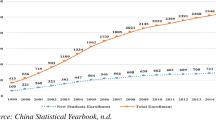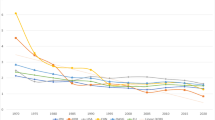Though government funding has shrunk, Nepal’s higher education (HE) sector has expanded in the last three decades in terms of the establishment of new institutions and the implementation of a series of projects funded by the World Bank. Using neoliberal instrumentalism as a theoretical framework and critical policy sociology as a methodological tool, this paper analysed key policy documents produced by the World Bank and the Government of Nepal for implementing three most recent HE projects in Nepal. The paper argues that a new version of human capital theory, which stems from neoliberal instrumentalism in education, has guided HE policies and practices of Nepal. Though a number of reform strategies are implemented with the aim of increasing performance and competition, the HE sector has become increasingly unresponsive to the needs of Nepali communities and societies.
Similar content being viewed by others
References
Becker, G.S. (1962) ‘Investment in human capital: a theoretical analysis’, The Journal of Political Economy 70(5): 9–49.
Bhatta, P., Adhikari, L., Thada, M., and Rai, R. (2008) ‘Structures of denial: student representation in Nepal’s HE’, Studies in Nepali History and Society 13(2): 235–263.
Clarke, V., and Braun, V. (2013) Successful qualitative research: a practical guide for beginners, London, UK: Sage.
Collins, C. and Rhoads, R. (2010) ‘The WB, Support for Universities, and Asymmetrical Power Relations in International Development’, HE 59(2): 181–205.
Dhakal, S. (2018) ‘The state of HE and vocational education and training sectors in Nepal’, in R. Cameron, S. Dhakal and J. Burgess (eds.) Transitions from education to work: workforce ready challenges in the Asia Pacific, New York, NY: Routledge, pp. 188–204.
Espinoza, O. (2017). Paulo Freire’s ideas as an alternative to HE neo-liberal reforms in Latin America. Journal of Moral Education, 46(4), 435–448.
Gale, T. (2001) ‘Critical policy sociology: historiography, archaeology and genealogy as methods of policy analysis’, Journal of Education Policy 16(5): 379–393.
Gibson, H. (2011) ‘Management, skills and creativity: the purpose and value of instrumental reasoning in education discourse’, Oxford Review of Education 37(6): 699–716.
Giroux, H. (2014) Neoliberalism’s war on HE, Chicago, Illinois: Haymarket Books.
Government of Nepal (1989) HSE Act 1989, Kathmandu, Nepal: Government of Nepal.
Government of Nepal (1992) Report of the National Education Commission 1992, Kathmandu, Nepal: Government of Nepal.
Government of Nepal (2015) HE Policy 2015, Kathmandu, Nepal: Government of Nepal.
Habermas, J. (1984) The theory of communicative action Vol. I, Boston, Massachusetts: Beacon Press.
Habermas, J. (1987) The theory of communicative action: Vol. II, Boston, MA: Beacon Press.
Harvey, D. (2005) A brief history of neoliberalism, Oxford, UK: Oxford University Press.
Kölbel, A. (2013) ‘(De)valuing HE: educated youth, generational differences and a changing educational landscape in Kathmandu, Nepal’, Comparative Education 49(3): 331–343.
McMahon, W.W. (2009) Higher learning, greater good: the private and social benefits of HE, Baltimore, MD: Johns Hopkins University Press Baltimore.
Molla, T., and Cuthbert, D. (2016) ‘Re-imagining Africa as a knowledge economy: premises and promises of recent HE development initiatives’, Journal of Asian and African Studies 53(2): 250–267.
OECD (1996) Lifelong learning for all: meeting of the Education Committee at ministerial level, 16–17 January 1996, Paris, France: OECD.
Psacharopoulos, G. (1985) ‘Returns to education: a further international update and implications’, The Journal of Human Resources 20(4): 583–604.
Regmi, K.D. (2019) ‘Critical policy sociology: key underlying assumptions and their implications for educational policy research’, International Journal of Research and Method in Education 42(1): 59–75.
Regmi, K.D. (in press) Educational governance in Nepal: weak government, donor partnership and standardised assessment. Compare: A Journal of Comparative and International Education. https://doi.org/10.1080/03057925.2019.1587704
Rizvi, F. and Lingard, B. (2010) Globalizing education policy, New York, NY: Routledge.
Rubenson, K. (2008) ‘OECD education policies and world hegemony’, in R. Mahon and S. McBride (eds.) OECD and transnational governance, Vancouver: UBC Press, pp. 242–259.
Schultz, T.W. (1961) ‘Investment in human capital’, The American Economic Review 51(1): 1–17.
Shrestha, I.M. and Khanal, S.K. (2016) ‘Indigenization of HE: reflections from Nepal’, in J. Xing and P.S. Ng (eds.) Indigenous culture, education and globalization: critical perspectives from Asia, Berlin: Springer, pp. 137–157.
Sijapati, B. (2005) ‘Perils of HE reform in Nepal’, Journal of Development and Social Transformation 2: 25–33.
Torres, C.A. and Schugurensky, D. (2002) ‘The political economy of HE in the era of neoliberal globalization: Latin America in comparative perspective’, HE 43(4): 429–455.
UGC Nepal. (2013) Education management information system: report on HE 2011/2012, Bhaktapur, Nepal: UGC.
World Bank (1993) First HE project: project appraisal document, Washington, DC: World Bank.
World Bank (2000) HE in developing countries: peril and promise, Washington, DC: World Bank.
World Bank (2002a) Constructing knowledge societies: new challenges for tertiary education, Washington, DC: World Bank.
World Bank (2002b) First HE project: implementation completion report, Washington, DC: World Bank.
World Bank (2003) Lifelong learning in the global knowledge economy: challenges for developing countries, Washington, DC: World Bank.
World Bank (2007) Second HE project: project appraisal document, Washington, DC: World Bank.
World Bank (2014) Second HE project: implementation and results report, Washington, DC: World Bank Group.
World Bank (2015) HE Reform Project 2014–2020: project appraisal document, Washington, DC: World Bank.
Author information
Authors and Affiliations
Corresponding author
Ethics declarations
Conflict of interest
Author declares that he/she has no conflict of interest.
Additional information
Publisher's Note
Springer Nature remains neutral with regard to jurisdictional claims in published maps and institutional affiliations.
Rights and permissions
About this article
Cite this article
Regmi, K.D. Higher Education in Nepal: A Handmaiden of Neoliberal Instrumentalism. High Educ Policy 34, 393–411 (2021). https://doi.org/10.1057/s41307-019-00138-0
Published:
Issue Date:
DOI: https://doi.org/10.1057/s41307-019-00138-0




